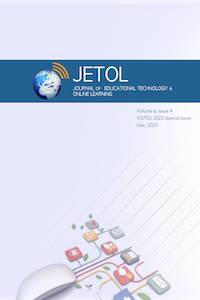Abstract
Learning engineering is a term and combines the process and practice that applies the sciences of learning using human-centered engineering design methodologies and data-driven decision making to support learners and their development. This term is about problem solving and aims to support learners and their development. In line with the indicated highlights and the aim of the term, this editorial study aims to investigate the history of the learning engineering. Accordingly, the study is structured into three sections: While the introduction part over the past and present perspectives of the learning engineering, the second part is constructed as follows: (1) definition of learning engineering (2) key components of learning engineering (3) instructional design in learning engineering (4) benefits of learning engineering (5) challenges and considerations (6) future of learning engineering. Finally, the conclusion and suggestion part is focused the role of learning engineering in the forthcoming era.
References
- Alkan, C. (2011). Eğitim Teknolojisi (8. Baskı). Ankara: Anı Yayıncılık.
- Baker, S. R., & Boser, U. (2021). High-leverage opportunities for learning engineering. https://learninganalytics.upenn.edu/Learning_Engineering_recommendations.pdf
- Dewey, J. (1922). Education as Engineering. New Republic, 20 September 1922, 89–91.
- Charters, W. W. (Feb. 14, 1945). Is There a Field of Educational Engineering? Educational Research Bulletin, 24(2), 29-37+56.
- EDUCAUSE (2020). 2020 EDUCAUSE Horizon Report™. Teaching and Learning Edition https://library.educause.edu/resources/2020/3/2020-educause-horizon-report-teaching-and-learning-edition
- Erb, S., Garg, K., Wagner, E., & Goodell, J. (2019). Why do you need learning engineering? Paper presented at the 2019 Conference on Learning Engineering, Arlington, Virginia, USA.
- Goodell, J., Kessler, A., Wiltrout, M. E., & Avello, M. (2021, June). Learning engineering@ scale. In Proceedings of the Eighth ACM Conference on Learning@ Scale (pp. 5-7).
- Goodell, J., Kolodner, J., & Kessler, A. (2023). Learning engineering applies the learning sciences. In, Learning engineering toolkit: Evidence-Based Practices from the Learning Sciences, Instructional Design, and Beyond (Eds. Goodell, J. & Kolodner, J.). Routledge
- IEEE (2019). What is Learning Engineering? https://sagroups.ieee.org/icicle/
- Kessler ,A. & IEEE ICICLE Design SIG (2020). Competencies of Learning Engineering Teams and Team Members. In IEEE ICICLE proceedings of the 2019 Conference on Learning Engineering, Arlington, VA, May 2019. https://sagroups.ieee.org/icicle/learning-engineering-process/
- Lee, V. R. (2023). Learning science and learning engineering: A natural or artificial distinction?. Journal of the Learning Sciences, 32(2), 288-304. https://doi.org/10.1080/10508406.2022.2100705
- Paquette, G., De La Teja, I., Léonard, M., Lundgren-Cayrol, K., & Marino, O. (2005). An instructional engineering method and tool for the design of units of learning. Learning design: A handbook on modelling and delivering networked education and training, 161-184.
- Simon, H. A. (1967). The Job of College President. Educational Record 48: 68-78.
- Wagner, Barr, A., Blake-Plock, S. Robson, P. (2018). 7 Things You Should Know About Learning Engineering. https://library.educause.edu/resources/2018/9/7-things-you-should-know-about-learning-engineering
- Wagner, E. D. (2019). Learning engineering. A primer (Community & Resources for ELearning Professionals). eLearning Guild. https://www.learningguild.com/insights/238/learning-engineering-a-primer/
- Wagner, E. D. (2021). Becoming a learning designer. In J. K. McDonald & R. E. West (Eds.), Design for Learning: Principle, Process, and Praxis. EdTech Books. Sunal-Cynthia, S., & Haas, M.E. (2008). Social studies for the elementary and middle grades: A constructivist approach (3rd ed.). Boston, MA: Pearson.
Abstract
References
- Alkan, C. (2011). Eğitim Teknolojisi (8. Baskı). Ankara: Anı Yayıncılık.
- Baker, S. R., & Boser, U. (2021). High-leverage opportunities for learning engineering. https://learninganalytics.upenn.edu/Learning_Engineering_recommendations.pdf
- Dewey, J. (1922). Education as Engineering. New Republic, 20 September 1922, 89–91.
- Charters, W. W. (Feb. 14, 1945). Is There a Field of Educational Engineering? Educational Research Bulletin, 24(2), 29-37+56.
- EDUCAUSE (2020). 2020 EDUCAUSE Horizon Report™. Teaching and Learning Edition https://library.educause.edu/resources/2020/3/2020-educause-horizon-report-teaching-and-learning-edition
- Erb, S., Garg, K., Wagner, E., & Goodell, J. (2019). Why do you need learning engineering? Paper presented at the 2019 Conference on Learning Engineering, Arlington, Virginia, USA.
- Goodell, J., Kessler, A., Wiltrout, M. E., & Avello, M. (2021, June). Learning engineering@ scale. In Proceedings of the Eighth ACM Conference on Learning@ Scale (pp. 5-7).
- Goodell, J., Kolodner, J., & Kessler, A. (2023). Learning engineering applies the learning sciences. In, Learning engineering toolkit: Evidence-Based Practices from the Learning Sciences, Instructional Design, and Beyond (Eds. Goodell, J. & Kolodner, J.). Routledge
- IEEE (2019). What is Learning Engineering? https://sagroups.ieee.org/icicle/
- Kessler ,A. & IEEE ICICLE Design SIG (2020). Competencies of Learning Engineering Teams and Team Members. In IEEE ICICLE proceedings of the 2019 Conference on Learning Engineering, Arlington, VA, May 2019. https://sagroups.ieee.org/icicle/learning-engineering-process/
- Lee, V. R. (2023). Learning science and learning engineering: A natural or artificial distinction?. Journal of the Learning Sciences, 32(2), 288-304. https://doi.org/10.1080/10508406.2022.2100705
- Paquette, G., De La Teja, I., Léonard, M., Lundgren-Cayrol, K., & Marino, O. (2005). An instructional engineering method and tool for the design of units of learning. Learning design: A handbook on modelling and delivering networked education and training, 161-184.
- Simon, H. A. (1967). The Job of College President. Educational Record 48: 68-78.
- Wagner, Barr, A., Blake-Plock, S. Robson, P. (2018). 7 Things You Should Know About Learning Engineering. https://library.educause.edu/resources/2018/9/7-things-you-should-know-about-learning-engineering
- Wagner, E. D. (2019). Learning engineering. A primer (Community & Resources for ELearning Professionals). eLearning Guild. https://www.learningguild.com/insights/238/learning-engineering-a-primer/
- Wagner, E. D. (2021). Becoming a learning designer. In J. K. McDonald & R. E. West (Eds.), Design for Learning: Principle, Process, and Praxis. EdTech Books. Sunal-Cynthia, S., & Haas, M.E. (2008). Social studies for the elementary and middle grades: A constructivist approach (3rd ed.). Boston, MA: Pearson.
Details
| Primary Language | English |
|---|---|
| Subjects | Learning Sciences |
| Journal Section | Articles |
| Authors | |
| Publication Date | December 31, 2023 |
| Submission Date | October 17, 2023 |
| Acceptance Date | December 21, 2023 |
| Published in Issue | Year 2023 Volume: 6 Issue: 4 - ICETOL 2023 Special Issue |

